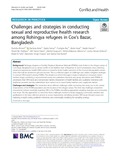| dc.contributor.author | Ahmed, Rushdia | |
| dc.contributor.author | Aktar, Bachera | |
| dc.contributor.author | Farnaz, Nadia | |
| dc.contributor.author | Ray, Pushpita | |
| dc.contributor.author | Awal, Abdul | |
| dc.contributor.author | Hassan, Raafat | |
| dc.contributor.author | Bin Shafique, Sharid | |
| dc.contributor.author | Hasan, Md Tanvir | |
| dc.contributor.author | Quayyum, Zahidul | |
| dc.contributor.author | Jafarovna, Mohira Babaeva | |
| dc.contributor.author | Kobeissi, Loulou Hassan | |
| dc.contributor.author | El Tahir, Khalid | |
| dc.contributor.author | Chawla, Balwinder Singh | |
| dc.contributor.author | Rashid, Sabina Faiz | |
| dc.date.accessioned | 2022-05-25T04:13:55Z | |
| dc.date.available | 2022-05-25T04:13:55Z | |
| dc.date.copyright | 2020 | |
| dc.date.issued | 2020-12-14 | |
| dc.identifier.citation | Ahmed, R., Aktar, B., Farnaz, N., Ray, P., Awal, A., Hassan, R., . . . Rashid, S. F. (2020). Challenges and strategies in conducting sexual and reproductive health research among Rohingya refugees in Cox’s bazar, Bangladesh. Conflict and Health, 14(1) doi:10.1186/s13031-020-00329-2 | en_US |
| dc.identifier.uri | http://hdl.handle.net/10361/16667 | |
| dc.description | This article was published in Conflict and Health by BMC [© The Author(s). 2020, corrected publication 2020. Open Access This article is licensed under a Creative Commons Attribution 4.0 International License,] and the definite version is available at: https://doi.org/10.1186/s13031-020-00329-2 The Journal's website is at: https://conflictandhealth.biomedcentral.com/articles/10.1186/s13031-020-00329-2 | en_US |
| dc.description.abstract | Background: Rohingya diaspora or Forcibly Displaced Myanmar Nationals (FDMNs), took shelter in the refugee camps of
Cox’s Bazar, Bangladesh due to armed conflict in the Rakhine state of Myanmar. In such humanitarian crises, delivering
sexual and reproductive health (SRH) services is critical for better health outcomes of this most-at-risk population where
more than half are adolescent girls and women. This is a reflective paper on challenges and related mitigation strategies
to conduct SRH research among FDMNs. The research on which this paper is based employed a concurrent mixedmethod design combining a cross-sectional survey and qualitative interviews and group discussions with FDMNs to
understand their SRH needs and demand-side barriers. Assessment of health facilities and qualitative interviews with
healthcare providers and key stakeholders were carried out to assess facility readiness and supply-side barriers.
Challenges and strategies: The researchers faced different challenges while conducting this study due to the unique
characteristics of the FDMN population and the location of the refugee camps. The three key challenges researchers
encountered include: sensitivity regarding SRH in the FDMNs, identifying appropriate sampling strategies, and community
trust issues. The key approaches to overcome these challenges involved: actively engaging community members and
gatekeepers in the data collection process to access respondents, identifying sensitive SRH issues through survey and
exploring in-depth during qualitative interviews; and contextually modifying the sampling strategy. Conclusion: Contextual adaptation of research methods and involving community and local key stakeholders in data
collection are the key lessons learnt from this study. Another important lesson was researchers’ identity and positionality
as a member of the host country may create distrust and suspicion among the refugees. The multi-level complexities of
humanitarian settings may introduce unforeseen challenges and interrupt research plans at different stages of research
which require timely and contextual adaptations. | en_US |
| dc.language.iso | en_US | en_US |
| dc.publisher | BMC | en_US |
| dc.relation.uri | https://conflictandhealth.biomedcentral.com/articles/10.1186/s13031-020-00329-2 | |
| dc.subject | Rohingya refugees | en_US |
| dc.subject | Humanitarian crises | en_US |
| dc.subject | Sexual and reproductive health | en_US |
| dc.subject | Situation analysis | en_US |
| dc.subject | Adolescent girls | en_US |
| dc.subject | Women | en_US |
| dc.title | Challenges and strategies in conducting sexual and reproductive health research among Rohingya refugees in Cox’s Bazar, Bangladesh | en_US |
| dc.type | Journal Article | en_US |
| dc.description.version | Published | |
| dc.contributor.department | Brac James P. Grant School of Public Health | |
| dc.identifier.doi | https://doi.org/10.1186/s13031-020-00329-2 | |
| dc.relation.journal | Conflict and Health | |

